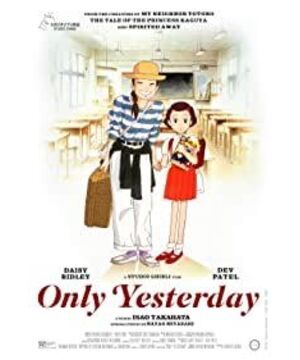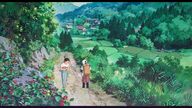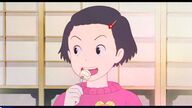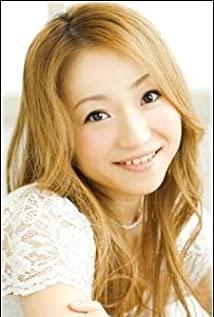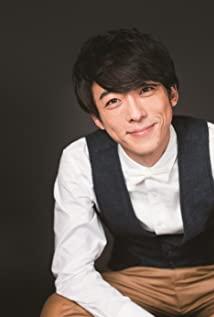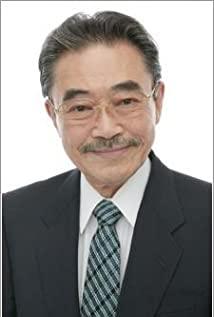I love the days when people are young, and even thinking of the word childhood brings up my spirits unnaturally. Childhood represents a period of carefree days, full of fun, but it is not only a time when you are not sensible, childhood will always affect the adult self, it will bring vague but kind memories, but also have a question.
Taeko is such a girl. She took ten days off to live in the countryside of her relatives. After living in the city for too long, she needed to relieve her pressure. She chose this green field and started her village. Life. But from the moment she set foot on the country life, she always thought back to her childhood.
Taeko's memories are not continuous, and most of them have nothing to do with current life, which is also related to Director Takahata Isao's dislike of narrating chronologically. In Taeko's memory, not everything has been reconciled: Taeko wanted to get a bag of his own, but his mother was unwilling to buy it for her, her sister sneered at her, and she refused to go out, thinking that her father could care. Give her a slap (in fact, it only takes a comforting word to soften her heart), and she gets a slap in the face.
But this slap made her very upset: why was it hit that time? But how can childhood be smooth sailing?
Under the seemingly healing-style poster, Takahata Xunke never modified the unpleasantness in life. These unpleasant things have become stories in memory: the family ate the "king of fruits" pineapple for the first time, and tasted it. The family thought it was not delicious, but Taeko ate all her sister’s portion; when she was growing up, Taeko was always afraid of the jokes of her peers, but her classmates were indifferent, which made her feel different; The final word, let Taeko's actor dream go to waste... But when recalling these things, the adult Taeko always smiled and said that it was no big deal, and maybe he couldn't realize his dream.
If there is an intention to "give youth", there will always be comparisons between old schoolmates and today in the movie, but in "A Fairy Tale of the Years", this perspective has never appeared. Whether it's a young classmate, a baseball boy he has a crush on, or his own parents and family, they don't appear in adult stories. Mr. Gao obviously disdains to use this level of perspective to impress the audience, and his perspective is closely aimed at Taeko's life change.
Speaking of which, the change of Taeko is just a turning point in the life of ordinary people. The film captures the story of the ordinary Taeko, so that we, the same ordinary audience, can feel the same. The psychological transition in "A Fairy Tale of the Years" may not develop in an orderly and orderly manner like an American road movie, but it captures Taeko's memories and allows Taeko to find the answer to the memories. The regrets of these memories are impossible It was made up, but it was a sign that Taeko was truly reaching adulthood. Just like us ordinary people, when the doubts in childhood are filled, we have a healthy personality and truly mature. After nearly 5 years of college career, I also feel "filled" after repeatedly retracing my childhood, so my mood is very different after seeing "The Fairy Tale of the Years" again.
But what impressed me most about "A Fairy Tale of Time" was the small details. These details formed Taeko's memories and established the film's classic title. When she was a child, Taeko was so cute. When cutting pineapples, she walked around with pineapple heads and pineapple cores. When she failed the exam, she slowly blew on the paper. Although Gao Lao's philosophy is to "maintain objectivity", in "A Fairy Tale of Time", Gao Lao is actually the same as Hayao Miyazaki, who can create the image of a little girl with personality, even if the films they shoot can be For adults, but still respect the world of children. "A Fairy Tale of Time" also transmits the Japanese family view. In Taeko's family, the father is a symbol of authority. Because all the family except him are women, Taeko will be more dependent on his father, and his mother will be more dependent. She is an auxiliary figure in the family. She is always calm on the outside, but she treats Taeko with a little indifference on the inside. Taeko's sisters always regard Taeko as a child and do not give her due care. This family view is a bit like the family view in Hirokazu Kore-eda's movies, which is calm as water on the outside, but choppy on the inside. In the second half of the sentence, what my father said, "We don't want to play in our family" is actually okay, but more importantly, the family members on the table became silent for a moment, and this silence made all words useless. In Japanese family movies, contradictions are not accompanied by hysterical quarrels, but superficial calmness, but thoughts drift into the hearts of everyone in the family. Although the family in "A Fairy Tale of Time" is just idle writing, this does not affect it. of brilliance.
So why is "The Fairy Tale of the Years" a classic, it's not just a touching memory, it's not just a turning point in Taeko's life, it's a lot more than we imagined, it has rich details of life, family view , there is the childishness of the childish and the more kind, and the values that director Takahata Isao has always attached. The moving of the film is not only the change of time, because the director has something to praise in childhood, time, change, and family. Someone asks why this is an animated film and not a live-action movie, to recall Taeko's sky-high and the meeting between Taeko and Toshio at the end. This is the existence of director Takada Isao's animation charm different from that of director Hayao Miyazaki.
View more about Only Yesterday reviews


